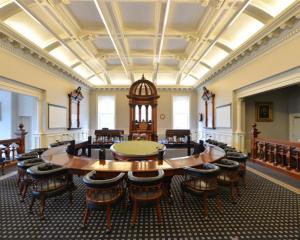Duplication of services and functions has been the major problem of the Dunedin City Council-owned companies for years, writes ODT Business Editor Dene Mackenzie.
If the council had adopted a leaner, more dynamic structure, such as has been adopted by publicly listed companies, the costs incurred by ratepayers - who are ultimately the shareholders of the council companies - would have been substantially less.
The DCC has company structures for each of its trading entities, while listed companies usually have a flatter and leaner structure by operating business units.
The council could remove the need for separate boards and directors' fees by changing its corporate structure.
Dunedin City Holdings, which oversees the council companies, has five directors - Paul Hudson (chairman), Ross Liddell, Michael Coburn, Norman Evans and Stuart McLauchlan.
Combined, those directors received a total of $591,623 in the 2010 financial year for their duties as DCHL directors and directorships of the companies owned by the council.
Mr Hudson earns a total of $116,026 from five boards, Mr Liddell earns $170,118 from six boards, Mr Coburn earns $93,430 from five boards, Mr Evans earns $94,930 from five boards and Mr McLachlan earns $117,119 from six boards (including Dunedin International Airport).
In the 2010 financial year, the council-owned companies had group revenue of $233.6 million.
In total, counting all directors of council-owned or controlled companies, including Taieri Gorge Railway and excluding the airport company, the city council pays $721,092 in directors' fees.
Contrast that with listed Hellaby Holdings, which last financial year had revenue of $457 million, has four business units, a leadership team of four, including the chief executive on a salary of $562,000.
There are six directors, including the chief executive, who receives no director's fees. Total directors' fees are $292,500.
The chairman of Hellabys receives $84,000, up from $80,000 in the previous financial year. The remaining four elected directors received $52,500 each, up from $50,000 in the previous corresponding year.
The Hellabys chief executive oversees the four units, rather than, as DCHL has done in the past, having chief executives for each of the seven major companies in which it has an interest.
That involves at least seven sets of monthly accounts, seven monthly board reports and separate audits - much of them overseen by the same directors.
The council owns half of Dunedin International Airport Ltd and appoints two directors. The Government appoints the other two.
With DCHL, the duplication is costing ratepayers far more money that it should and Hellabys is subject to NZX continuous disclosure rules, meaning the so-called $8 million dividend shortfall from the DCHL companies would have been reported to shareholders (city councillors and ratepayers) well before last week.












